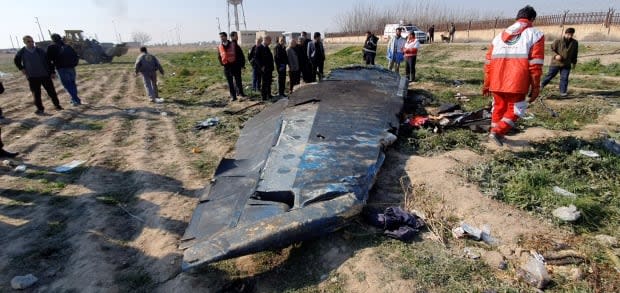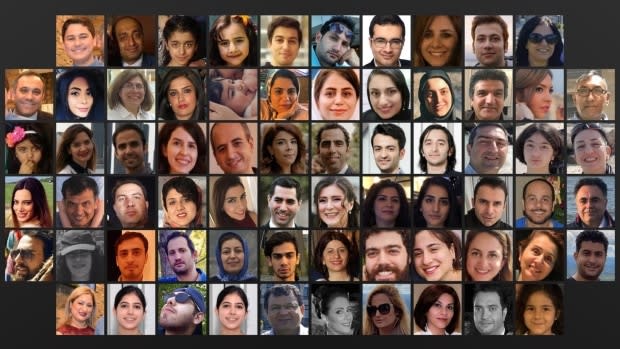The downing of Flight PS752: Iran may have kept airspace open due to lucrative overflight fees

Iran made more than $100 million a year in overflight fees after the ISIS surge in neighbouring countries. That revenue might have factored into the fateful decision not to shut down Iran's airspace the night Ukraine International Airlines Flight PS752 was shot down, according to multiple aviation experts.
"It's because of the money," said Babak Taghvaee, who has worked in Iran's military aerospace industry and is the author of two books on Iranian military aviation. "It's a huge amount of money for the [Iran Airports] Company and the ministry of transportation."
In recent years, Iran has taken advantage of its location beside Iraq and near Syria by providing a safe passage for foreign airlines to fly between Europe and Asia or from Asia to other areas of the world. Like many countries, Iran charges airlines an overflight fee for using its airspace.
According to an analysis of estimates provided by the International Air Transport Association, Iran's overflight fees are more than double Canada's. With more than 800 flights a day and an average bill of more than $1,000 Cdn per flight — overflight revenue was a business in Iran worth hundreds of thousands of dollars daily.
Iran's airport authority reported to Iranian media it earned more than $140 million in overflight revenue between March 2018 and March 2019.

'It was going to be a panic'
Iran admitted its military mistakenly shot down the jet on Jan. 8, just hours after Iran's forces fired missiles at Iraqi bases where U.S. troops were stationed. The attack was in retaliation for an American drone strike that killed a high-ranking Iranian military general in Iraq. All 176 people on board the plane died including 55 Canadian citizens and 30 permanent residents of Canada.
Some were families travelling with young children, while others were professors or university students with big dreams. Ever since, victims' families have wondered why the flight was allowed to take off at all.
Taghvaee says Iran kept commercial planes in the sky on a night of heavy military activity to "normalize the situation."
"When Iranians feel that the war is coming they quickly go to the money exchange companies, they go to the banks and buy foreign currency," said Taghvaee."Then the foreign airlines were going to panic and switch their flights to Iraq. It was going to be a panic inside the country and outside the country."
The Iran Airports Company did not respond to a request for comment.
'They're very dependent on foreign currency'
Ukrainian-Canadian global affairs analyst Michael Bociurkiw said it could have been a mixture of incompetence and miscommunication between civilian and military officials that caused the airspace to remain open. But he says overflight fees may have also been a factor.
He noted Iran has been under economic pressure because the Trump administration hit the country with severe sanctions in 2018.
"They're very dependent on foreign currency, foreign income which overflight fees gives them," said Bociurkiw. "So it was ... probably factored into that decision."
Bociurkiw was a member of the first team of international observers to reach the crash site of Malaysian Airlines Flight MH17, which was shot down over Ukraine in 2014, killing 298 people. He acted as the spokesperson for the Organization for Security and Co-operation in Europe — observing and relaying information from the crash site to a long list of countries, including Canada.
He said the MH17 investigation revealed that countries are often reluctant to close their own airspace for economic reasons. The loss in revenue also stretches beyond airport fees, he said.
"I think that it does send a bad signal for investment for tourism as well," said Bociurkiw. "For countries like Afghanistan, Iraq and Iran, who are very dependent on any source of foreign currency, their reluctance to close down airspace would be very, very great."
Watch: Analyst Michael Bociurkiw explains why he thinks Iran left its skies open to commercial traffic during an armed conflict with the U.S.
Breakdown across the board
Andrew Nicholson, the CEO of Osprey Flight Solutions in the U.K., works with airlines around the world providing risk management. Before the night Flight PS752 was shot down, his company labelled the risk level "extreme" and warned his clients to stop flying over Iran.
Nicholson said the Iranian government, military, civil aviation authority and airport, as well as the airline, all bear responsibility and had a role to play in keeping passengers safe.
"All the way across the board there were failures in risk management across all those organizations," he said.
"I think it's much more likely that that confusion, that high-tension environment, led to a breakdown in the process or a breakdown in the communication between the relevant organizations that would need to have been in the discussions about closing airspace."
Canadian Foreign Affairs Minister François-Philippe Champagne will be in Ukrainian capital Kyiv Tuesday for a two-day visit that will include meeting with Ukraine International Airlines to talk about speeding up compensation for victims' families.
Watch: The National: Money may have kept Iran's airspace open when Flight 752 was shot down


